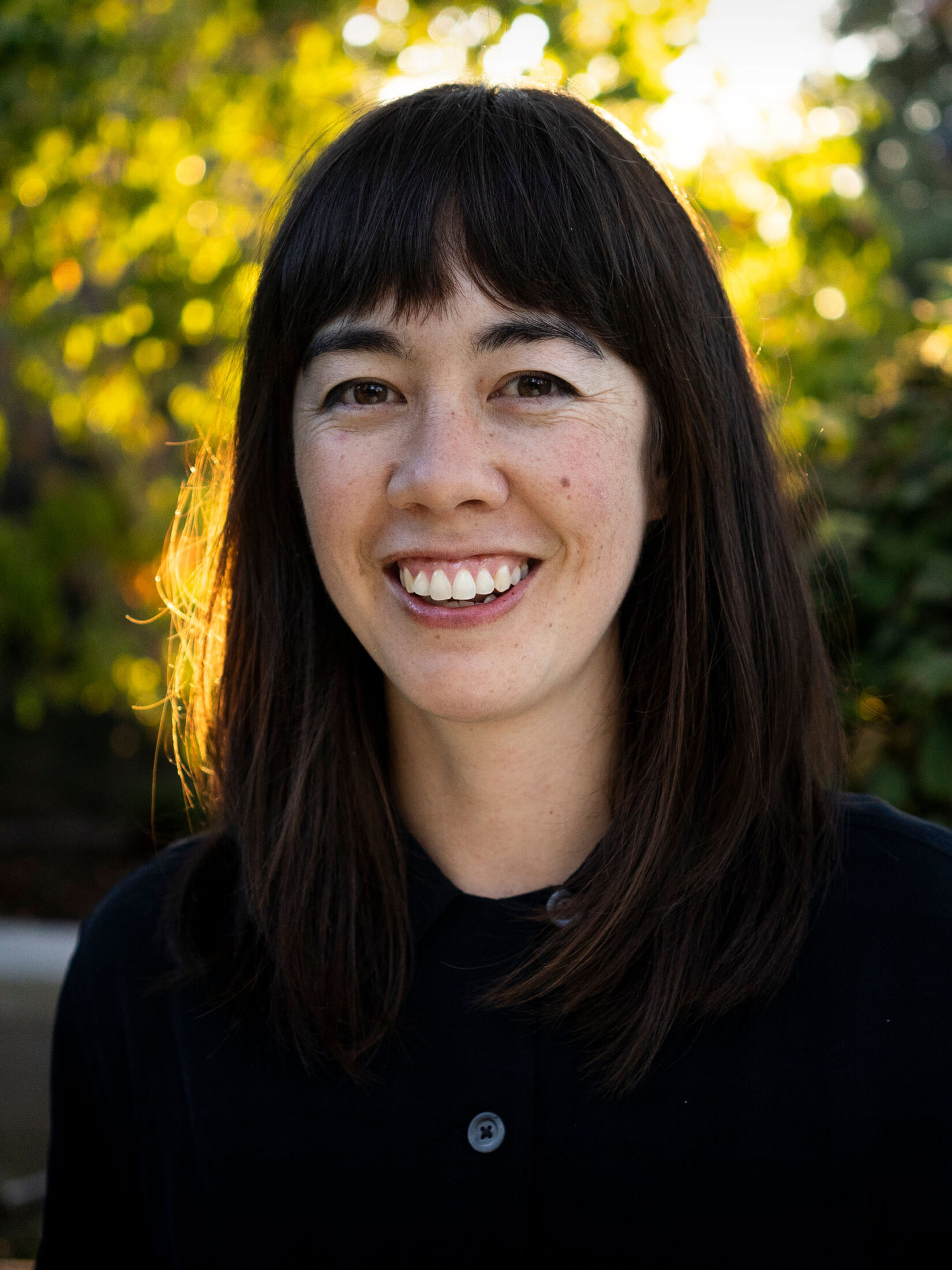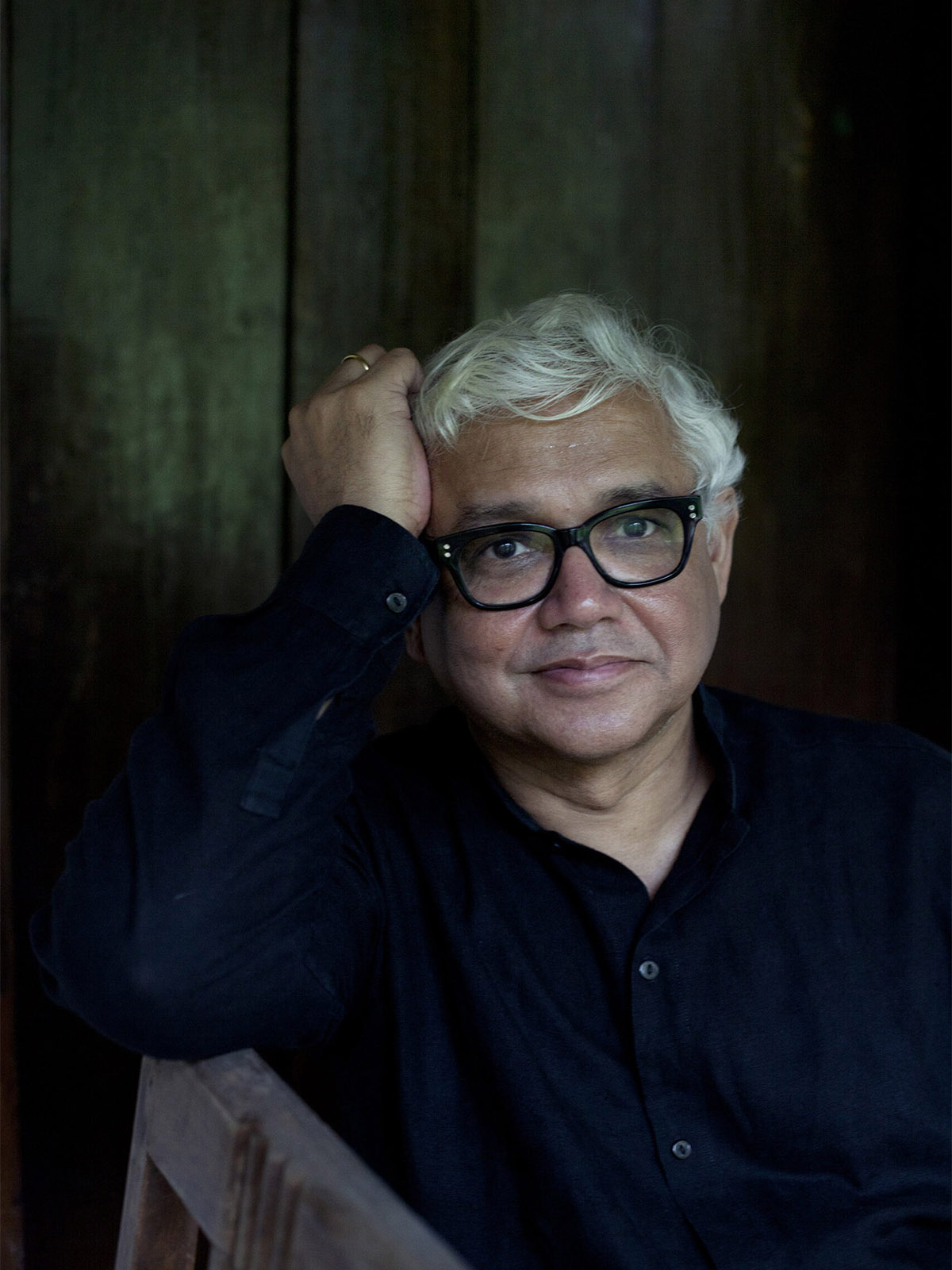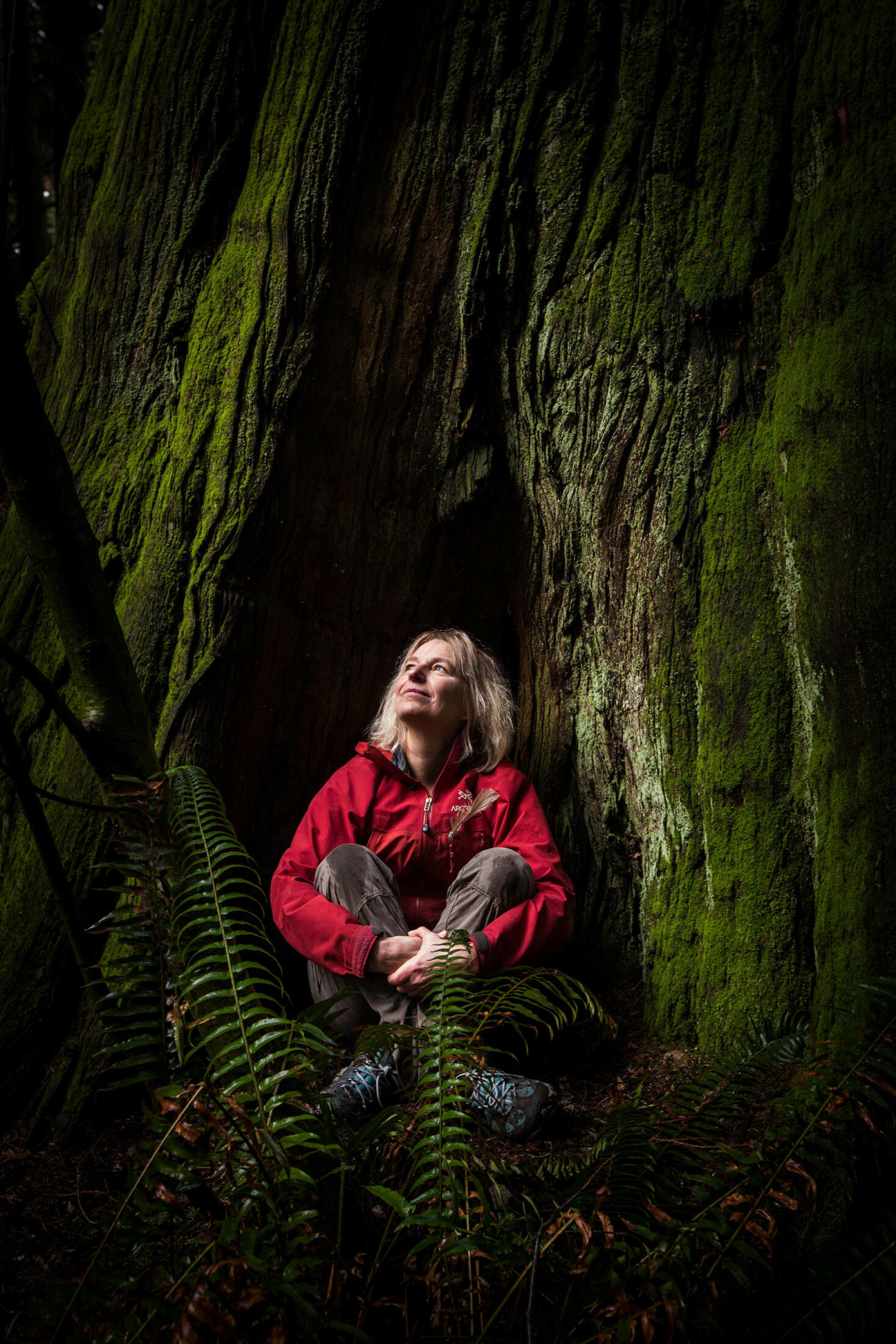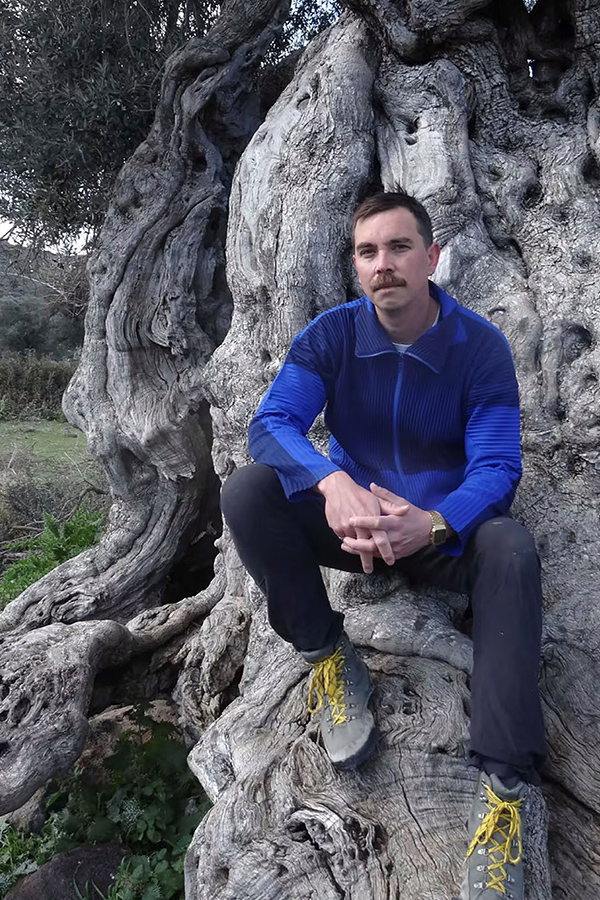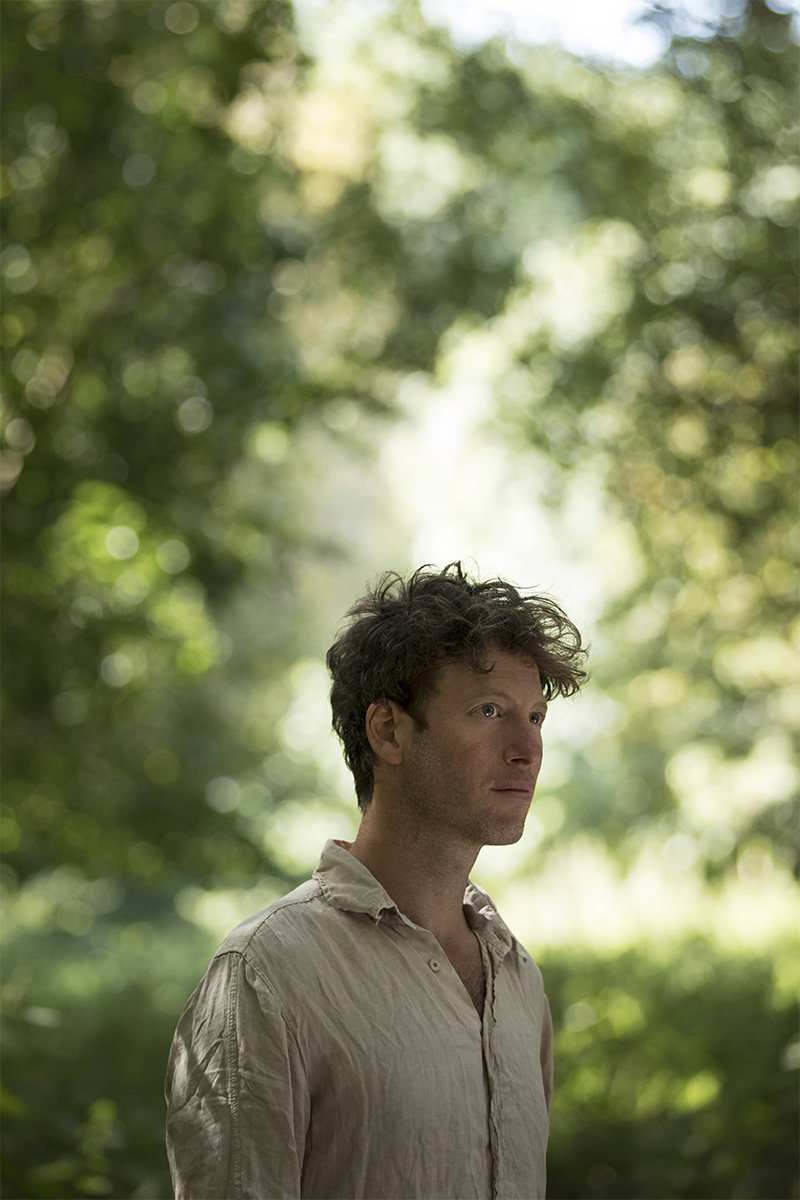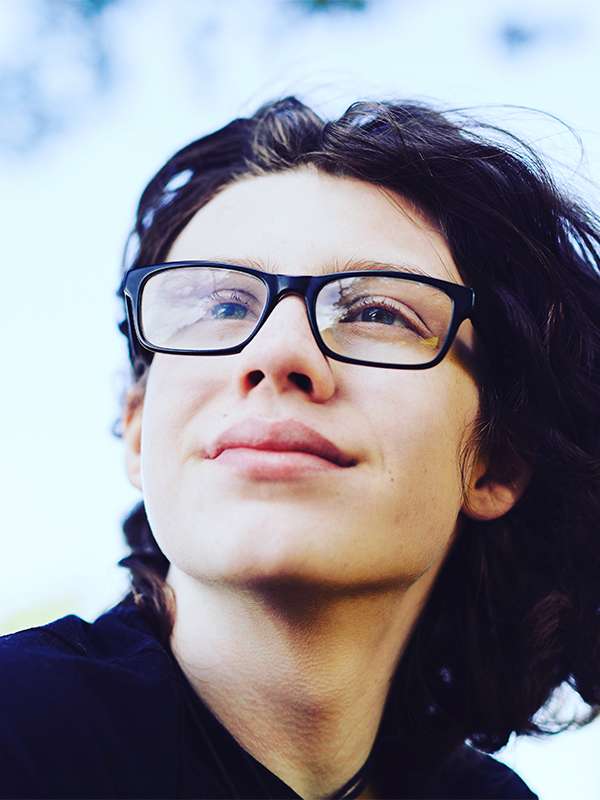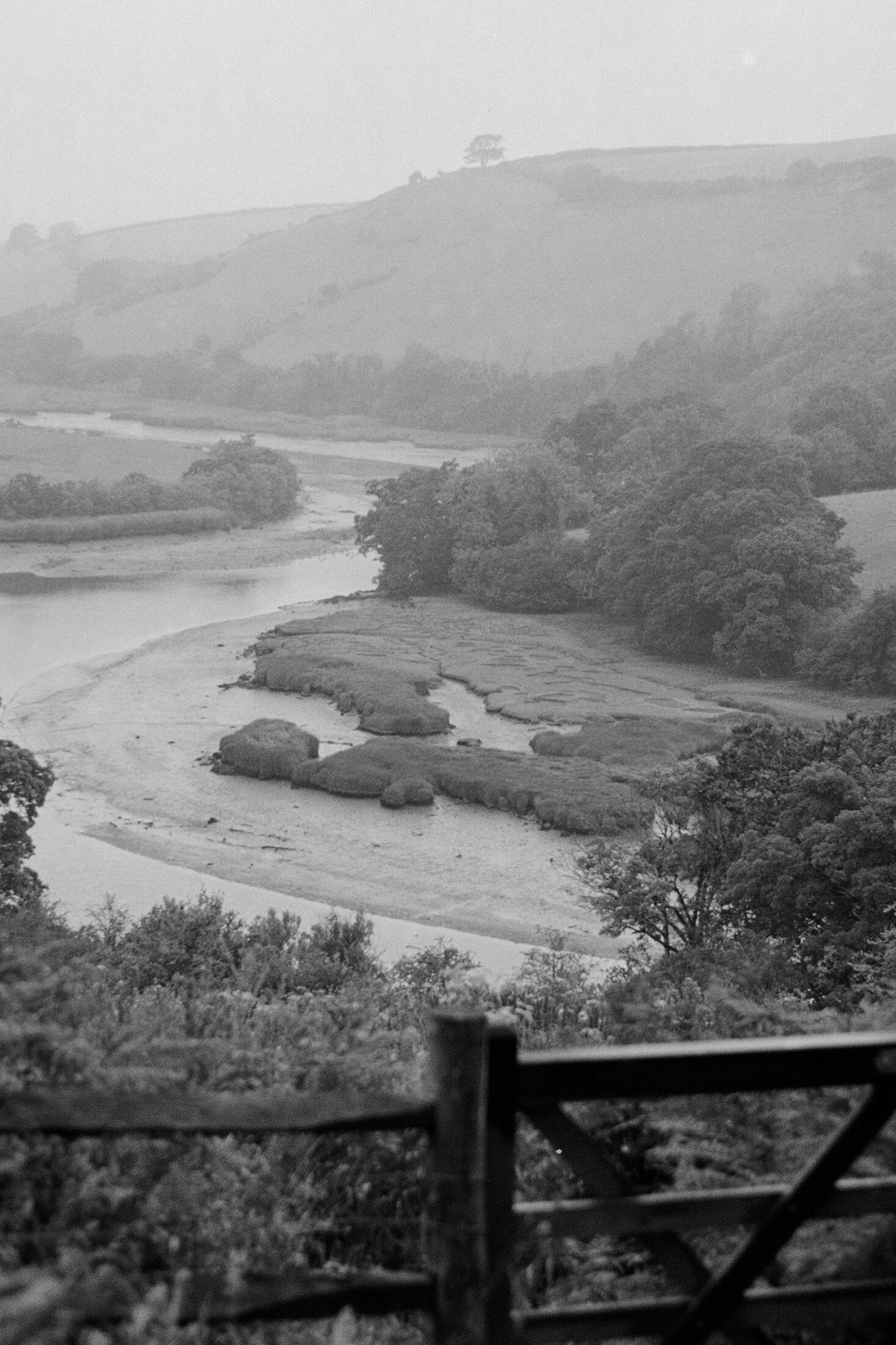
Stepping into the Liminal
Emmanuel Vaughan-Lee is an author, Emmy- and Peabody Award–nominated filmmaker, and a Sufi teacher. He has directed more than twenty documentary films, including Taste of the Land, The Last Ice Age, Aloha Āina, The Nightingale’s Song, Earthrise, Sanctuaries of Silence, and Elemental, among others. His films have been screened at New York Film Festival, Tribeca Film Festival, SXSW, and Hot Docs, exhibited at the Smithsonian Museum and London’s Barbican, and featured on PBS POV, National Geographic, The New Yorker, and The New York Times Op-Docs. His new book, Remembering Earth: A Spiritual Ecology, is forthcoming from Shambhala in summer 2026. He is the founder, podcast host, and executive editor of Emergence Magazine.
In this talk, given at Emergence’s recent Shifting Landscapes retreat held at Sharpham Trust in Devon, England, Emmanuel Vaughan-Lee offers a frame for how we might navigate our current moment of unprecedented transition and transformation. Speaking to what can take root when we truly open ourselves to grief, love, and ultimately kinship with the living world, he urges us to recognize the liminal—the space between worlds—as an invitation to step into new ways of being.
Transcript
So the liminal. We were speaking about liminal—this space between the worlds, the space that is opened up as one world comes to an end and another one begins, even if it is very, very nascent. The space between the worlds. And I want to offer a frame this evening that is both for the retreat and the time that we have together, but also perhaps a frame for navigating shifting landscapes; a frame for finding our way between the worlds in this space of the liminal, the space of the unknown. And while we may not think the world as we know it has come to an end, if you peer closely between the cracks, it’s not quite as sturdy as it seems. And there is a space that has opened up, especially in the last few years as the pandemic laid bare so many aspects of our civilization and our way of being that were not just unsustainable, but they were unreal. And this space that opened up between the worlds is as much an invitation to step into a new way of being as it is a challenge to all of us to find our bearings. It is a paradox. It is a contradiction. It is also an invitation.
And so I’d like to offer a frame for how we can try to be in this space. A frame that is also about offering something in this space—not just as a way to navigate, to find our bearings, to operate—but a space in which we can offer something of ourselves and begin to be in relationship with something much greater than ourselves. Because this space between the worlds opens up that possibility in a way that it hasn’t really before. It invites us into a space that it hasn’t really before, by necessity one might say. Because if you are paying attention—and I know you are paying attention, why would you come all the way to be here if you weren’t paying attention—then you would see that there is a space that demands our attention: the space between the worlds. Where the landscapes are shifting, and the rules are somewhat unknown. They are unknown. Things do not function in the same way as they have before. We think we live a life defined by rules, by cause and effect, and yet if you look closely, you see that so much of that has gone out of the window and so much can shift from one day to another. What was something that you could count on is something that is no longer reliable, because we are in a space between the worlds and the liminal.
And the first step, if you will, at this time is to truly acknowledge the space that we are in. To acknowledge that we are in a time where one world is ending and another one is beginning. To really take stock. To look at the reality that is facing us and acknowledge that one way of life has come to an end. It may not appear that way: the trains are full of people going on holiday, the motorways are full of cars, our phones are consistently reminding us of the world out there that we should be engaging in, which is not real. But it has come to an end. It is not as real as it was. And we must recognize that, because if we do not then we will remain trapped in it. We can’t have one foot in that world and one foot in the other. We must step from that world into the liminal, into the space between the worlds, so that we can free ourselves from the grip and the patterns of control, and domination, and manipulation that the old era knows only too well. We have to acknowledge that it is no longer a world we can invest in—invest our lives in, invest ourselves in—unless we want to stay asleep, unless we want to turn away from the reality of what is really unfolding. Because before one can step into a new space, one has to let go consciously of an old one. Otherwise, you bring those patterns into the new space that you enter. You’re not free.
And so we have to take stock and acknowledge that the world as we know it has shifted and we have to leave it behind. And I’m not talking practically, outwardly in your lives, as far as quitting our jobs and getting rid of our cars—although it can be tempting. It is more a shift of story, a shift of frame, a shift of understanding—it’s inside of ourselves. We may have to continue playing along to some degree in this old world, because we can’t all disappear and live off-grid in the wilderness. But we don’t have to buy into it, we don’t have to give ourselves to it. Instead, we can acknowledge what it really is—a mirage that has held us in a grip for far too long, a dream which has held us for far too long. And we can either wake up—really wake up— and enter a different space, or we can stay semi-asleep, not really taking responsibility for what we can see. And once we have freed ourselves—at least in our minds, in our consciousness, in our hearts—from this old way of being, we have a space of separation in which to see what has been unfolding in the past and what will unfold in the present. We have the ability to see.
There is space where there was not space before. We can see things differently. We perceive things differently because there is space now where there was not space; because we have claimed something and said, “No. No more will I give myself to an old dream which is doing nothing but destroying everything in its path.” There is space now to see things differently, to perceive things differently, and to witness—most important, there is a space to witness. Because when one steps back, the periphery one can see is much greater. We are not caught, we are not reacting, we are not gripped in the same way—there is space. We see, we perceive, we understand differently. And there is so much at this time that we must witness. Because the shifts that are unfolding are so monumental—they are mythic. They are mythic. We cannot understand them unless we use the language of myth. They are so great. When all the ice caps melt, and all the seas rise, and all the forests burn, and all the species die—that is mythic in scale. It dwarfs the biblical.
And we have to witness what is unfolding; witness what is unfolding in front of us in an intimate way in our own lives, and witness what is unfolding in the distance that is part of our collective, shared experience of these vast changes, these vast shifting landscapes. We have to witness. We have to be responsible and witness. Because we cannot leave behind the old world and step into a new without acknowledging what is happening, without bearing witness to what is happening. And each and every day it is in front of us, demanding our attention. We cannot go from the darkness to the light unless we look and acknowledge it—bear witness to it. Any real transformation, whether it be within ourselves or within the world writ large, must not run from the darkness, but look to it, because within it is the light. And the world demands our attention. The living world, the human world demands our attention as witnesses to acknowledge what is happening, to give it our attention, but not to get caught in it.
There is a distinction: to give your attention without getting caught in it. That is what you are given when you step into this new space. You have that space to bear witness without being caught in it because you have stepped away from it. You have stepped outside of the room and you’re looking at the room. You are not in the room, caught in the dynamic of the room anymore. It’s a simple thing, but very powerful—to step back. And you see things in a new light.
This witnessing has many purposes, many levels, many layers—to witness on the collective level, as we daily take in the information that is given to us about these distant shifts occurring in landscapes all around the world. Because there is a collective witnessing that is tremendously powerful if we give it a certain attention, a certain space. Not gripped in fear, overtaken by eco-anxiety, but witnessing with a space and maturity that says I am here to bear witness to you, to acknowledge what is happening, but not to be caught. Because how can I be of use if I am caught? How can I be of use if I am caught? I am not free.
And this witnessing—it has the power to break us open. To break us open. To break our hearts open. And if it isn’t breaking our hearts open, go back and look again. Go back and look again. Because just as the situation that is unfolding around us demands us to witness, it also demands our hearts to respond, to be broken open, to feel, to acknowledge through our feeling, what unfolds inside of us. Because the grief that can pour out of our beings, out of our hearts, when we are in a state of witnessing is a key. It can unlock something in our own beings. And it is an honest and true response. To feel grief, to feel pain, to feel the cry of the Earth—that is an honest, real response. And if the Earth is to be remembered and thought of as a sacred, living being and related to as a sacred, living being, then it asks of us to respond from a real place inside of ourselves. And if it is dying, or sick, or in pain—just as a human being who is dying, or sick, or in pain—and you cannot respond from a real place inside of you where there is grief, then it is not honest. It is not real.
And there is a truth telling that is happening in this time. A truth telling. And if we witness from the right place inside of ourselves with the space that we have stepped into, then there is a truthfulness present that can unlock something inside ourselves. Because when something is true, it hits us differently. We know truth. It hits us, in our core. When we are truly present, things can change inside of ourselves. A key can turn and unlock something inside of ourselves when we bear witness with the space and attention—are not caught. And the grief can pour out of us.
And I know many of you have no doubt already experienced this grief, because you are awake. You’re paying attention. How can one not feel grief when one sees the beauty and brethren suffering? How can one not? But grief is not a onetime experience. Grief is an ongoing experience when one is in relationship with one that one loves, that one cares for. There are cycles of grief that go on, and on, and on, if one is paying attention. One does not get over it—say I’ve done that, I’ve grieved. No. Because it is unfolding, and deepening, and shifting in front of our eyes in such a profound way. And if this grief is held with consciousness, just as stepping outside of the reality of the world we live in and saying no, this is not real—that is a use of consciousness. If we hold this grief with consciousness, it has the ability to transform us. When one holds things with consciousness, it is a very different experience. Just like the key that can be turned when one witnesses with truth and attention, how that can open one’s heart to grief, when one holds grief with consciousness and awareness, and says this is not something I should run from, this is actually something I should feel, this is real—a key is also turned. Grief opens another doorway. The series of doorways that lead deeper and deeper and deeper. As one turns away from the world and says no, not this—the doorway is opened. When one witnesses, the doorway is opened into grief. When one is in a space of grief, held with consciousness, a doorway opens. And that doorway opens to love. That is part of the story that is unfolding as one world comes to an end and another is being born.
We are being taught a lesson—reminded who we really are—in a very painful way. Because that grief we feel—when we hold it with attention and it unlocks something—what does it unlock? This grief is not for the “other.” The grief includes us, because there is no other. That is part of the lesson that we are learning: that there is no other. The grief we feel is the pain that we are witnessing. It is not just our response that makes us feel grief: it is shared grief, shared pain. Our mother, our brother, our sister—they are not separate from us. And there lies deep within us, at our core, the memory that we are one. That we are not separate from the living Earth, just as we are not separate from other human beings. And that isn’t something that one has to learn. That’s something that one remembers; that lies deep within our memory, in our DNA, in our marrow—so deep it needs something very potent to get to the core. And the grief that we can feel at this time, it has that potency, because it is monumental, it is mythic. The grief is mythic in scale because what is unfolding is mythic in scale. What we are witnessing is mythic in scale. Leaving behind one world and putting our attention towards another—that is mythic in scale. And it has the power to cut right to the core of our beings and wake up this ancient memory of what once was. We return. We remember. We go deep to something that was once. And what is there, but love. Not a Hallmark kind of love, not a human kind of love—an ancient primordial kind of love. A primordial covenant, if you will, of relationship between us and the living Earth.
When that love is awoken, something changes. We spin differently on an energetic frequency. A note that has been silenced for so long, is present. A whole way of being suddenly appears inside of us. And it’s not new. It’s very, very old. It’s so much greater than us. It can hold us. It can envelop us, if we let it. If we allow our attention to be there, if we don’t run from the grief, and run from the love, because it scares us. We allow it to envelop us, to hold us. We allow ourselves to feel it—to feel this ancient memory returning to us that this grief has opened us up to experience. Because the world that we are heading towards is a world that must be grounded in this ancient memory of what connects us in the most primordial of ways—that there is no other. That we are all one. That the Earth and all of the beings that exist within her are part of us and we are part of them. This is ancient, ancient wisdom. Every wisdom tradition around the world knows this to be true—holds this at the core of their tradition. And this is what you must return to as we move towards the world that is emerging. We’re not leaving behind everything that existed before. We are returning to what we have forgotten and beginning with that foundation; leaving behind the world that created this era of forgetfulness as we move towards an era of remembrance where we are consciously aware of the ties of kinship that unite us on this deep fundamental level. And those ties of kinship form the foundations of how we will live our lives, how our societies will grow. The stories we will tell will be grounded in this fundamental truth of kinship. And kinship grows from love. And love grows from kinship.
And grief has this power. Anyone who has sat by the bed of a dying parent, or a dying friend has experienced how the grief opens them up to an experience of love that they never thought possible—a love that holds sadness and pain and joy and so much more. And grief has this power, this possibility, this potential, and when that love is awakened, what do we do with it? What is our responsibility? Because when something is awakened, it is just the first step, because it can so easily go back to sleep, be covered over by our patterns, individual or collective—our patterns of forgetfulness. If this love is awakened inside of us through this grief, then we must be attentive to it. We must take responsibility for it, just like we must take responsibility for witnessing—not running from the pain of grief. As doors open and keys open those doors, as these layers unfold, they reveal layers of responsibility requiring layers of attention—inviting us to participate in deep, meaningful ways as human beings.
And anyone who has been in love knows that love—if it is to last, and deepen, and grow into friendship and companionship, and a real dynamic relationship that includes so many facets—it requires your constant attention. Otherwise, love fades. The passion drifts away. So we must learn to be attentive to that love, to acknowledge that love, to integrate that love into every aspect of our lives and our beings. Because that love is a conduit of relationship. Kinship leads to love, love leads to kinship—it’s a conduit of relationship. It’s like tendrils shooting out, inviting the other in. Because we are not being attentive to that love inside of us only; we are being attentive to that Love, capital L. Not as something that is just within us—it is something that exists outside of us. That is what has broken open—that ancient memory of a love that is not confined only within our hearts. There’s a love that exists in our heart and the greater Heart. Our heart and the greater Heart. And so we become attentive to it. We give it what it needs.
And we find ways to act and live with this love at the core. So that wherever we go, whatever we do, that consciousness of that love is present. When we walk, we walk with love. When we breathe, we breathe with love. When we eat, we eat with love. When we see, we see with love. You do not have to become a mystic and devote your life to the pursuit of this love to find this love. This is what is so remarkable about the time we are living in—the extreme situation has opened a whole new realm of possibilities. The grief that we have, the grief that we feel, is so potent it unlocks something that used to take a whole lifetime to unlock—an ancient love, an ancient secret that there is no other.
So we must find these ways to bring this love into our life, to acknowledge this. And here we find familiar paths in front of us, because praise-making is not something new. All praise-making comes from the affirmation and acknowledgment of love. It’s from love to love. You praise with love to love. You praise because you love. It is as ancient as human beings. Praise-making is as ancient as human beings. It doesn’t have to be part of any religion, it doesn’t have to be part of any structure—that is so much part of the old. It is not owned by anyone, nor can it be controlled by anyone. And we must find our own ways to praise. It can be as simple as bearing witness to the wind as it moves through the trees and the sound of birdsong. A different quality of being comes to life, a different quality of light is present because a different quality of love is present. A love inside of us has been broken open, and reminded of what it is: part of something all around it. And this time of the liminal, it holds this possibility of great darkness and great light—to be held in both hands with eyes wide open, with hearts wide open, unafraid to feel the grief, unafraid to step away from the familiar, unafraid to step deeper towards ourselves, even if that means leaving ourselves behind and embracing the unknown within and without. To me, this is the story of our time. This is the journey that is unfolding. It’s not about a sustainable future or a green economy. It’s about something so much greater, so much simpler. And we don’t know where it will lead us or what it will do, but it is real. It’s ancient, it’s real, and it’s part of us. We don’t have to find it, we have to return to it.
And in these next few days together, I want to find simple ways together so that this space that is opening up is something that we can experience together—how we can walk with a certain attention, removing ourselves so that we can be present as we really are. To learn the power of silence. To return us to who we really are. Very, very, very simple things. So it isn’t an intellectual theoretical exercise but something we can experience, something that we feel. And we are reminded how simple it is—when we give it our attention, when we give it our fearlessness, when we give it our love and our humility—how simple it is.
In all the stories that we publish at Emergence, if you look to the core, what each one is trying to tell, it is this story: returning to something simple. The simple way of being, where kinship is something that we feel, that we know, that we touch and taste with familiarity, not as strangers, but as friends.
So I say welcome the unknown. Welcome this space. Step into it with open arms unafraid. Allow yourself to be uncomfortable and recognize that what we can contribute—it matters. It is not an outer action, but an inner way of being. Because if anything that materializes in the outer is not grounded on a truth that is held within, it is going to be fleeting. It will fade away, just like one’s love can fade away if there is not attention, engagement, and acknowledgment, and praise, and care. There’s a poem I like very much that was on the welcome letter that you all got, from N. Scott Momaday:
When we dance the earth trembles. When our steps fall on the earth we feel the shudder of life beneath us, and the earth feels the beating of our hearts, and we become one with the earth. We shall not sever ourselves from the earth. We must chant our being, and we must dance in time with the rhythms of the earth. We must keep the earth.
Because acknowledgment leads to acknowledgment in return. When we love and we praise, it is not landing on deaf ears—it is heard and there is a response. When we dance, the earth trembles. When our steps fall on the earth, we feel the shudder of life beneath us, and the earth feels the beating of our hearts. When we walk, and we feel, and we acknowledge, it acknowledges, and a great conversation can ensue. There is a call and there is a response. We must chant our being in all the ways that we as individuals can chant our being, whether that be through song or silence. We must chant our being and we must dance in time, returning to the rhythms of the Earth. Acknowledging, acknowledging, acknowledging. Remembering, remembering, remembering. Returning, returning, returning to this core of who we are, which unites us with everything in existence.
